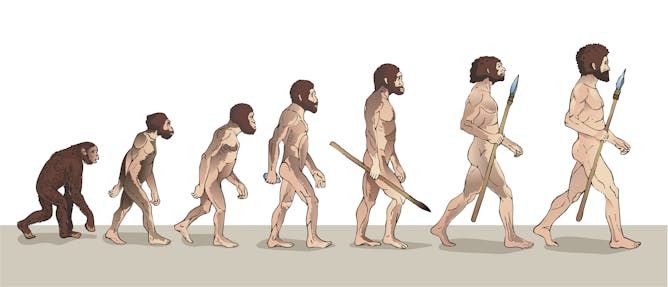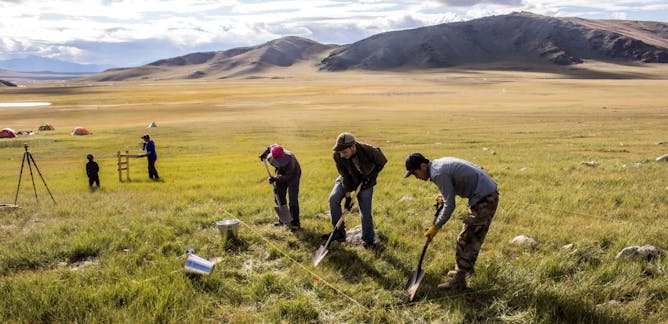|
The conflict in Cameroon is conspicuously absent from the African Union’s Peace and Security Council despite the fact that its job is to facilitate timely and efficient responses to conflict and crisis on the continent. Cheryl Hendricks and Gabriel Ngah Kiven argue that this is because the conflict is partly driven by a separatist agenda, which means that Cameroon’s territorial integrity is at stake. This has put the African Union in a quandary, given its commitment to the inviolability of borders.
The famous “march of progress” that supposedly shows humanity’s evolution from knuckle-dragging ape to upstanding master of the planet is an icon of science and has found its own life in countless memes that reinforce the idea that evolution is about constant improvement and growing complexity. But in reality it doesn’t always work like that. Rather than constantly gaining novel genes that provide useful new features, organisms sometimes lose genes and develop a simpler form. Now research has revealed just how common this gene loss is.
Even after Sudanese president Omar al-Bashir was indicted for crimes against humanity by the International Criminal Court for atrocities he orchestrated in Darfur he continued to travel freely throughout Africa. That impunity now looks set to end. The Sovereign Council that replaced him in 2019 has agreed to hand him over to the court. Michelle Nel weighs up the options available to satisfy the requirements of justice.
|

Supporters of Cameroonian President Paul Biya outside the French embassy in Yaounde.
Getty Images/AFP
Cheryl Hendricks, Human Sciences Research Council; Gabriel Ngah Kiven, University of Johannesburg
The African Union's intervention track record in conflict situations is mixed.
|

Usagi-P/Shutterstock
Jordi Paps, University of Bristol; Cristina Guijarro-Clarke, University of Essex
New research shows animal evolution often involves losing genes and becoming less complex.
|
Politics + Society
|

Michelle Nel, Stellenbosch University
The African Union's staunch support for al-Bashir, cloaked in criticism of the International Criminal Court, denied justice to the millions affected by the conflict in Sudan.
| |

Rahul Sambaraju, Trinity College Dublin; Suryapratim Roy, Trinity College Dublin
India's current citizenship policies alter the constitutional notion of citizenship and use it as a proxy for national belonging in othering minorities.
|
|
|
Health + Medicine
|

Michelle Sconce Massaquoi, University of Oregon
As the coronavirus spreads, public health officials stress the importance of hand washing. But can it really make that much of a difference? A microbiologist explains why.
| |

Grahame Hardie, University of Dundee
Cordyceps fungi that turn insects into "zombies" produce a compound that might be useful for treating cancer.
|
|
|
Science + Technology
|

Vandana Janeja, University of Maryland, Baltimore County
Machine learning technology was first to sound the alarm about the new coronavirus. Its success illustrates how AI is boosting epidemiology.
| |

William Taylor, University of Colorado Boulder
Archaeologists have long argued over when and how people first domesticated horses. A decade ago, new techniques appeared to have provided answers – but further discoveries change the story again.
|
|
|